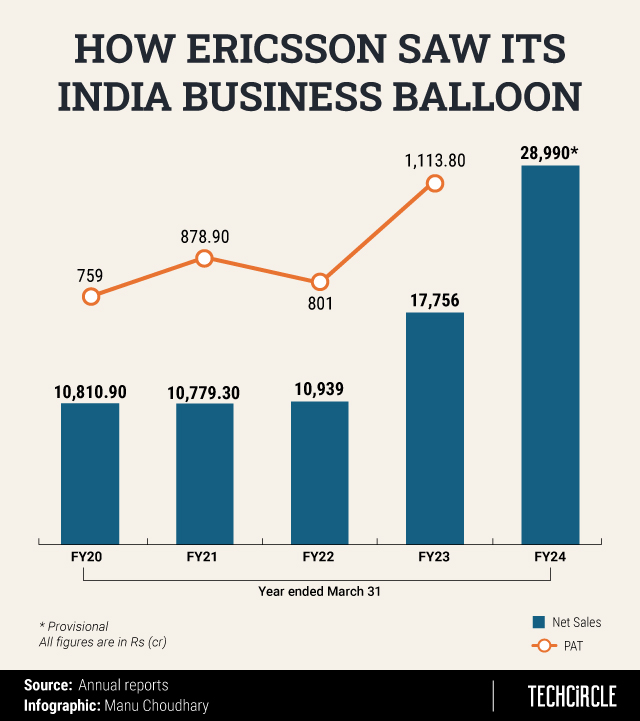
Ericsson’s India business hits $3.5 bn riding on 5G rollout but topline is now tapering


Swedish telecommunication network infrastructure and services provider Ericsson has seen a major jump in its India business, thanks to the 5G rollout over the last one year and as it consolidated the company’s local operations by merging two key units operating in the country.
The company, which specialises in selling telecom infrastructure, software, and managed services, has been a key partner for major telecom providers in India as they transition to 5G networks.
Ericsson witnessed a 63% increase in revenue, reaching around ₹29,000 crore for the year ended March 31, up from ₹17,756 crore in FY23, TechCircle has gathered. This surge was largely driven by its partnerships with Indian telecom giants Bharti Airtel and Reliance Jio, who have selected Ericsson to deploy 5G networks across the country.

Last year, Ericsson India Private Limited (EIP) was merged with its local parent Ericsson India Global Services Private Limited (EIG) and the combined firm saw a major jump in revenues.
Before the merger, EIG provided specialised engineering, managed services for operating and supporting the network, network engineering, and research and development of software-based solutions for its group companies.
On its part, EIP catered to the telecommunication infrastructure requirements of all key service providers and is one of the key vendors for majority of the already implemented and the ongoing 5G roll-out requirements. It also provides network maintenance services to these telcos, bringing recurring revenue streams.

EIP was the business that had been contributing the most in terms of revenue, so much so that India’ contribution to the global total had touched the 12% mark, three times the previous year.

On the flip side, the Swedish group may be past its peak as its growth seems to have hit the plateau after the one-time surge from the initial rollout gain. This is because bulk of the 5G roll-out has been completed across the country by the two top telcos. As a result, the absolute revenue itself is likely to shrink this financial year.

In the second quarter of 2024, Ericsson's global sales dropped by 7%, reaching SEK 59.8 billion.
While presenting the results for the three months ended June 30, Börje Ekholm, President and CEO, Ericsson, noted: “We expect market conditions to remain challenging this year, as the pace of India investments slow, however our sales will benefit during the second half from contract deliveries in North America.”
Looking ahead, Ericsson's Mobility Report estimates that by 2028, 5G will comprise approximately 57% of all mobile subscriptions in India, up from 10 million users. The average data consumption per smartphone is expected to more than double from 26 GB per month in 2022 to 62 GB by 2028, showcasing the growing demand for faster, more reliable mobile networks.

This may yet help the company sustain high revenues, albeit not growing at the same pace as the past, in India.
To meet growing demand, the company has been supplying telecom infrastructure, including 4G and 5G radios, microwave products, and RAN Compute. Ericsson's expansion strategy in India also includes increased local production in collaboration with Jabil in Pune, which is expected to support India's large-scale network rollouts while creating around 2,000 jobs.
The company is also setting up a technology center to drive new product development, testing, and integration to ensure efficient and high-quality 5G deployment.

